Impact of Social Determinants of Health: A Case Study Analysis Report
VerifiedAdded on 2022/09/13
|6
|1742
|16
Report
AI Summary
This report provides a detailed analysis of the social determinants of health, using a case study to illustrate the impact of various socio-economic factors on individual and family well-being. It defines social determinants according to the World Health Organization and examines socio-demographic characteristics like age, education, and employment, highlighting their influence on health outcomes. The report explores how factors such as family structure, education levels, and occupation contribute to health inequalities. It emphasizes the critical role of education in promoting health awareness, access to healthcare, and economic stability, while also discussing the importance of addressing these determinants through awareness campaigns and healthcare professional interventions. The analysis underscores the significance of health equity and provides insights into how healthcare professionals can assess and address social determinants to improve health outcomes for vulnerable populations.
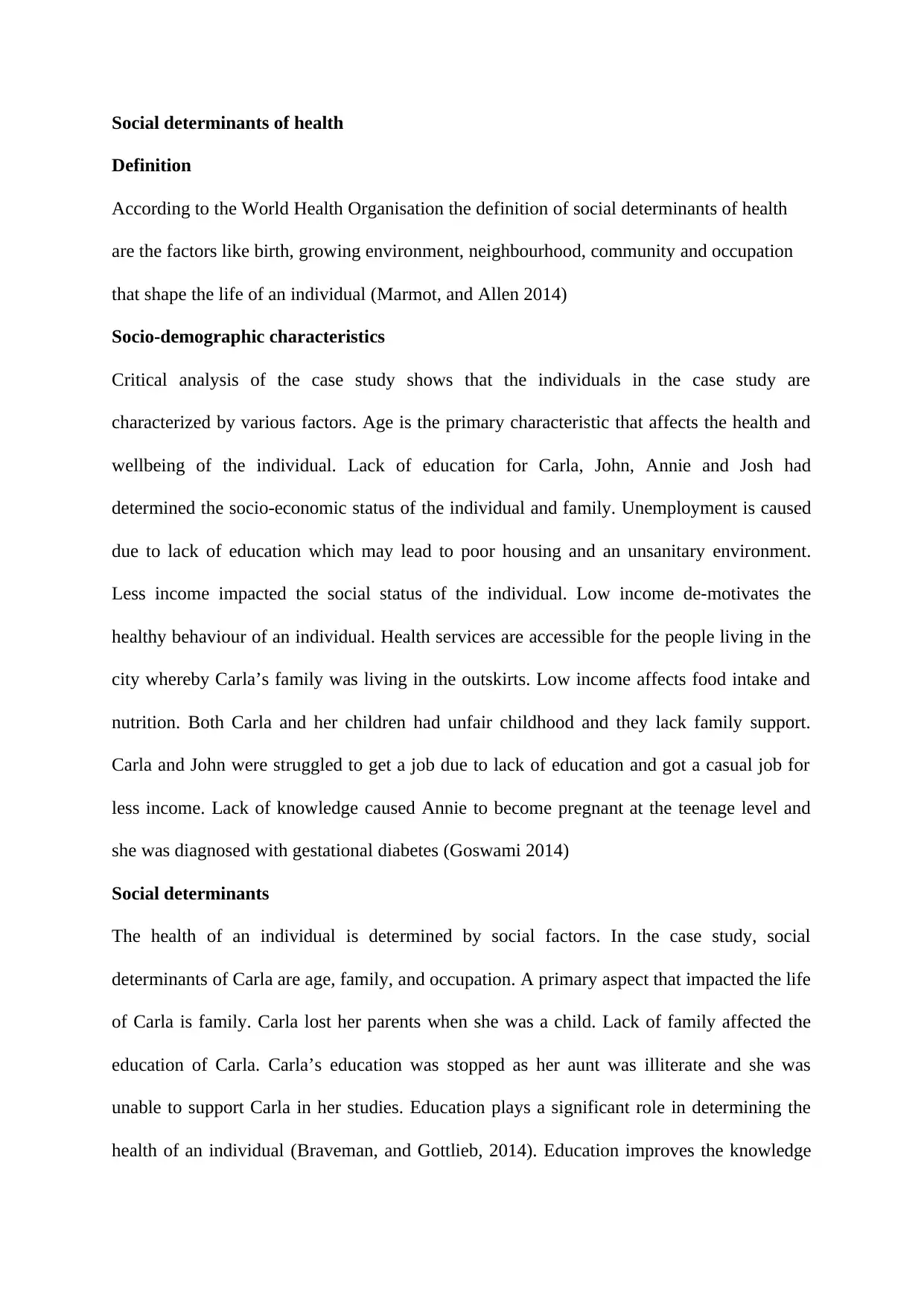
Social determinants of health
Definition
According to the World Health Organisation the definition of social determinants of health
are the factors like birth, growing environment, neighbourhood, community and occupation
that shape the life of an individual (Marmot, and Allen 2014)
Socio-demographic characteristics
Critical analysis of the case study shows that the individuals in the case study are
characterized by various factors. Age is the primary characteristic that affects the health and
wellbeing of the individual. Lack of education for Carla, John, Annie and Josh had
determined the socio-economic status of the individual and family. Unemployment is caused
due to lack of education which may lead to poor housing and an unsanitary environment.
Less income impacted the social status of the individual. Low income de-motivates the
healthy behaviour of an individual. Health services are accessible for the people living in the
city whereby Carla’s family was living in the outskirts. Low income affects food intake and
nutrition. Both Carla and her children had unfair childhood and they lack family support.
Carla and John were struggled to get a job due to lack of education and got a casual job for
less income. Lack of knowledge caused Annie to become pregnant at the teenage level and
she was diagnosed with gestational diabetes (Goswami 2014)
Social determinants
The health of an individual is determined by social factors. In the case study, social
determinants of Carla are age, family, and occupation. A primary aspect that impacted the life
of Carla is family. Carla lost her parents when she was a child. Lack of family affected the
education of Carla. Carla’s education was stopped as her aunt was illiterate and she was
unable to support Carla in her studies. Education plays a significant role in determining the
health of an individual (Braveman, and Gottlieb, 2014). Education improves the knowledge
Definition
According to the World Health Organisation the definition of social determinants of health
are the factors like birth, growing environment, neighbourhood, community and occupation
that shape the life of an individual (Marmot, and Allen 2014)
Socio-demographic characteristics
Critical analysis of the case study shows that the individuals in the case study are
characterized by various factors. Age is the primary characteristic that affects the health and
wellbeing of the individual. Lack of education for Carla, John, Annie and Josh had
determined the socio-economic status of the individual and family. Unemployment is caused
due to lack of education which may lead to poor housing and an unsanitary environment.
Less income impacted the social status of the individual. Low income de-motivates the
healthy behaviour of an individual. Health services are accessible for the people living in the
city whereby Carla’s family was living in the outskirts. Low income affects food intake and
nutrition. Both Carla and her children had unfair childhood and they lack family support.
Carla and John were struggled to get a job due to lack of education and got a casual job for
less income. Lack of knowledge caused Annie to become pregnant at the teenage level and
she was diagnosed with gestational diabetes (Goswami 2014)
Social determinants
The health of an individual is determined by social factors. In the case study, social
determinants of Carla are age, family, and occupation. A primary aspect that impacted the life
of Carla is family. Carla lost her parents when she was a child. Lack of family affected the
education of Carla. Carla’s education was stopped as her aunt was illiterate and she was
unable to support Carla in her studies. Education plays a significant role in determining the
health of an individual (Braveman, and Gottlieb, 2014). Education improves the knowledge
Paraphrase This Document
Need a fresh take? Get an instant paraphrase of this document with our AI Paraphraser
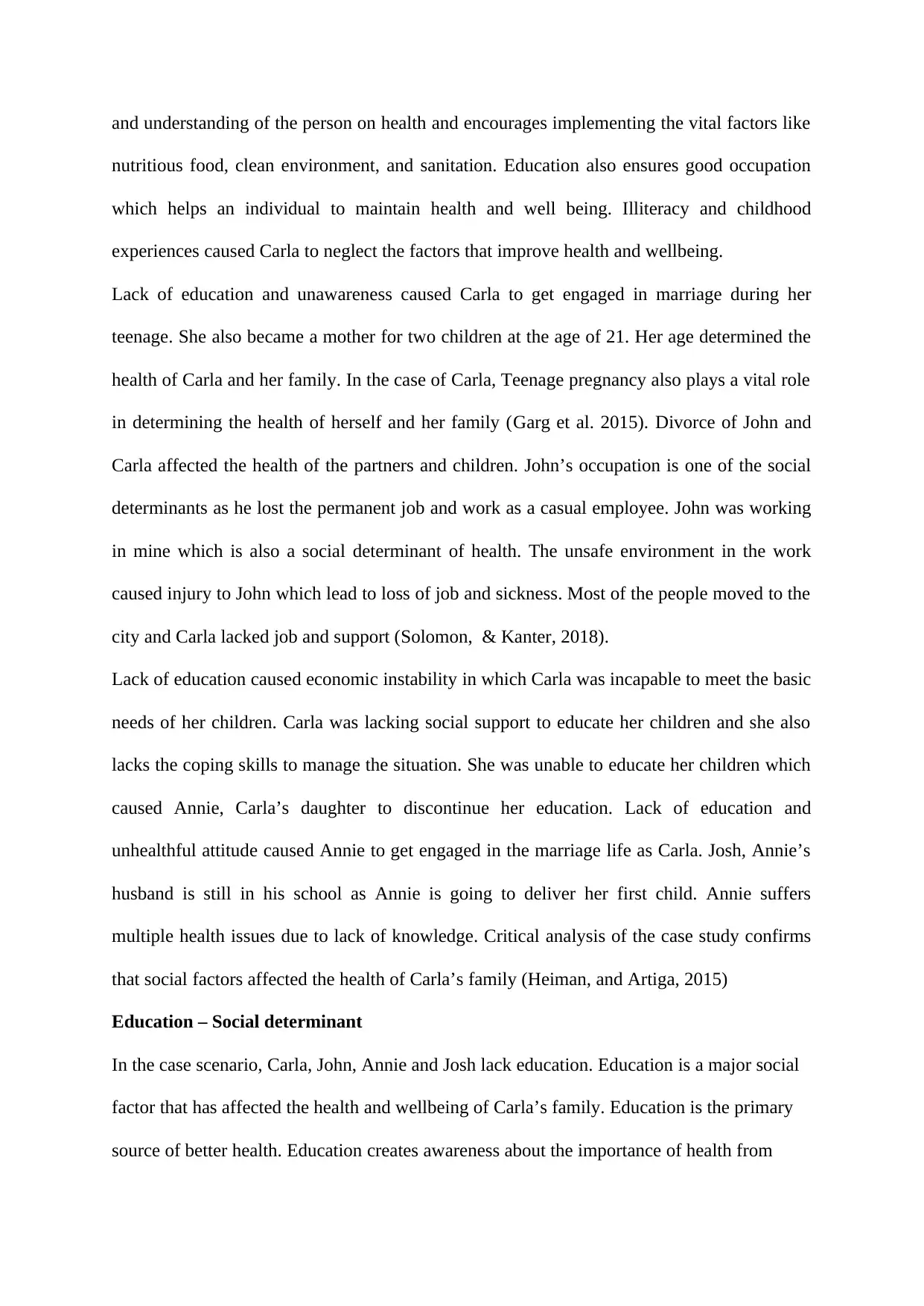
and understanding of the person on health and encourages implementing the vital factors like
nutritious food, clean environment, and sanitation. Education also ensures good occupation
which helps an individual to maintain health and well being. Illiteracy and childhood
experiences caused Carla to neglect the factors that improve health and wellbeing.
Lack of education and unawareness caused Carla to get engaged in marriage during her
teenage. She also became a mother for two children at the age of 21. Her age determined the
health of Carla and her family. In the case of Carla, Teenage pregnancy also plays a vital role
in determining the health of herself and her family (Garg et al. 2015). Divorce of John and
Carla affected the health of the partners and children. John’s occupation is one of the social
determinants as he lost the permanent job and work as a casual employee. John was working
in mine which is also a social determinant of health. The unsafe environment in the work
caused injury to John which lead to loss of job and sickness. Most of the people moved to the
city and Carla lacked job and support (Solomon, & Kanter, 2018).
Lack of education caused economic instability in which Carla was incapable to meet the basic
needs of her children. Carla was lacking social support to educate her children and she also
lacks the coping skills to manage the situation. She was unable to educate her children which
caused Annie, Carla’s daughter to discontinue her education. Lack of education and
unhealthful attitude caused Annie to get engaged in the marriage life as Carla. Josh, Annie’s
husband is still in his school as Annie is going to deliver her first child. Annie suffers
multiple health issues due to lack of knowledge. Critical analysis of the case study confirms
that social factors affected the health of Carla’s family (Heiman, and Artiga, 2015)
Education – Social determinant
In the case scenario, Carla, John, Annie and Josh lack education. Education is a major social
factor that has affected the health and wellbeing of Carla’s family. Education is the primary
source of better health. Education creates awareness about the importance of health from
nutritious food, clean environment, and sanitation. Education also ensures good occupation
which helps an individual to maintain health and well being. Illiteracy and childhood
experiences caused Carla to neglect the factors that improve health and wellbeing.
Lack of education and unawareness caused Carla to get engaged in marriage during her
teenage. She also became a mother for two children at the age of 21. Her age determined the
health of Carla and her family. In the case of Carla, Teenage pregnancy also plays a vital role
in determining the health of herself and her family (Garg et al. 2015). Divorce of John and
Carla affected the health of the partners and children. John’s occupation is one of the social
determinants as he lost the permanent job and work as a casual employee. John was working
in mine which is also a social determinant of health. The unsafe environment in the work
caused injury to John which lead to loss of job and sickness. Most of the people moved to the
city and Carla lacked job and support (Solomon, & Kanter, 2018).
Lack of education caused economic instability in which Carla was incapable to meet the basic
needs of her children. Carla was lacking social support to educate her children and she also
lacks the coping skills to manage the situation. She was unable to educate her children which
caused Annie, Carla’s daughter to discontinue her education. Lack of education and
unhealthful attitude caused Annie to get engaged in the marriage life as Carla. Josh, Annie’s
husband is still in his school as Annie is going to deliver her first child. Annie suffers
multiple health issues due to lack of knowledge. Critical analysis of the case study confirms
that social factors affected the health of Carla’s family (Heiman, and Artiga, 2015)
Education – Social determinant
In the case scenario, Carla, John, Annie and Josh lack education. Education is a major social
factor that has affected the health and wellbeing of Carla’s family. Education is the primary
source of better health. Education creates awareness about the importance of health from
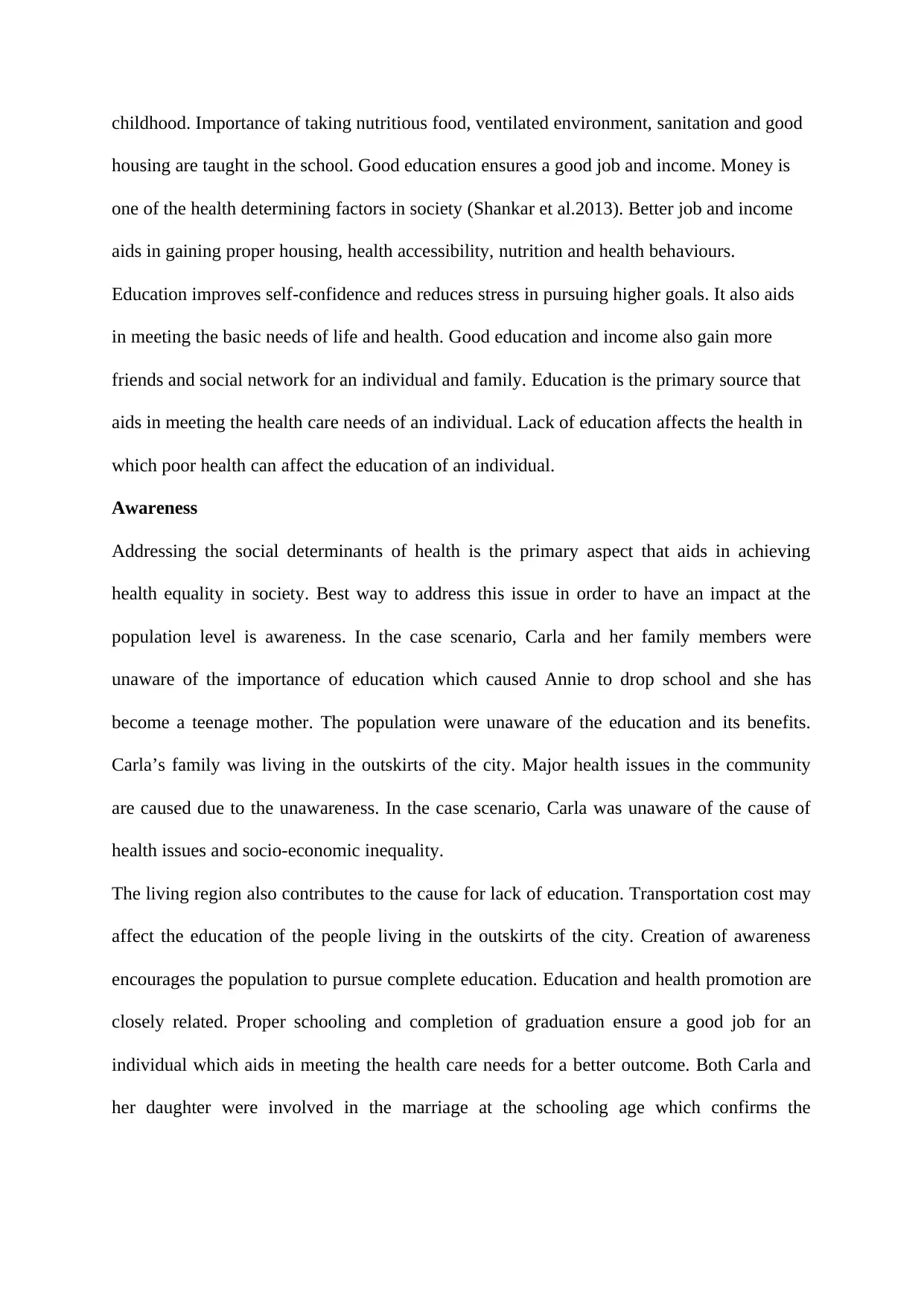
childhood. Importance of taking nutritious food, ventilated environment, sanitation and good
housing are taught in the school. Good education ensures a good job and income. Money is
one of the health determining factors in society (Shankar et al.2013). Better job and income
aids in gaining proper housing, health accessibility, nutrition and health behaviours.
Education improves self-confidence and reduces stress in pursuing higher goals. It also aids
in meeting the basic needs of life and health. Good education and income also gain more
friends and social network for an individual and family. Education is the primary source that
aids in meeting the health care needs of an individual. Lack of education affects the health in
which poor health can affect the education of an individual.
Awareness
Addressing the social determinants of health is the primary aspect that aids in achieving
health equality in society. Best way to address this issue in order to have an impact at the
population level is awareness. In the case scenario, Carla and her family members were
unaware of the importance of education which caused Annie to drop school and she has
become a teenage mother. The population were unaware of the education and its benefits.
Carla’s family was living in the outskirts of the city. Major health issues in the community
are caused due to the unawareness. In the case scenario, Carla was unaware of the cause of
health issues and socio-economic inequality.
The living region also contributes to the cause for lack of education. Transportation cost may
affect the education of the people living in the outskirts of the city. Creation of awareness
encourages the population to pursue complete education. Education and health promotion are
closely related. Proper schooling and completion of graduation ensure a good job for an
individual which aids in meeting the health care needs for a better outcome. Both Carla and
her daughter were involved in the marriage at the schooling age which confirms the
housing are taught in the school. Good education ensures a good job and income. Money is
one of the health determining factors in society (Shankar et al.2013). Better job and income
aids in gaining proper housing, health accessibility, nutrition and health behaviours.
Education improves self-confidence and reduces stress in pursuing higher goals. It also aids
in meeting the basic needs of life and health. Good education and income also gain more
friends and social network for an individual and family. Education is the primary source that
aids in meeting the health care needs of an individual. Lack of education affects the health in
which poor health can affect the education of an individual.
Awareness
Addressing the social determinants of health is the primary aspect that aids in achieving
health equality in society. Best way to address this issue in order to have an impact at the
population level is awareness. In the case scenario, Carla and her family members were
unaware of the importance of education which caused Annie to drop school and she has
become a teenage mother. The population were unaware of the education and its benefits.
Carla’s family was living in the outskirts of the city. Major health issues in the community
are caused due to the unawareness. In the case scenario, Carla was unaware of the cause of
health issues and socio-economic inequality.
The living region also contributes to the cause for lack of education. Transportation cost may
affect the education of the people living in the outskirts of the city. Creation of awareness
encourages the population to pursue complete education. Education and health promotion are
closely related. Proper schooling and completion of graduation ensure a good job for an
individual which aids in meeting the health care needs for a better outcome. Both Carla and
her daughter were involved in the marriage at the schooling age which confirms the
⊘ This is a preview!⊘
Do you want full access?
Subscribe today to unlock all pages.

Trusted by 1+ million students worldwide
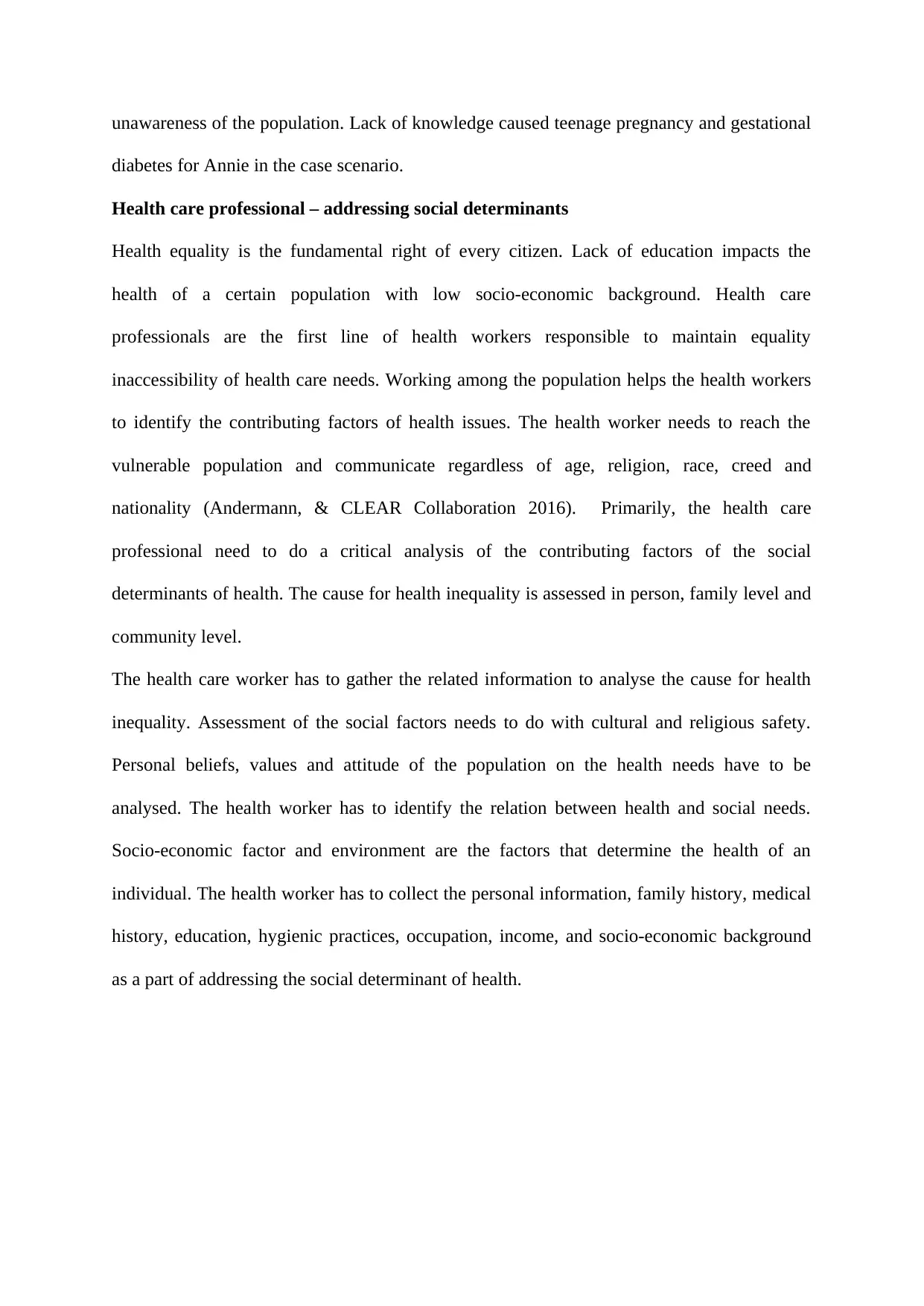
unawareness of the population. Lack of knowledge caused teenage pregnancy and gestational
diabetes for Annie in the case scenario.
Health care professional – addressing social determinants
Health equality is the fundamental right of every citizen. Lack of education impacts the
health of a certain population with low socio-economic background. Health care
professionals are the first line of health workers responsible to maintain equality
inaccessibility of health care needs. Working among the population helps the health workers
to identify the contributing factors of health issues. The health worker needs to reach the
vulnerable population and communicate regardless of age, religion, race, creed and
nationality (Andermann, & CLEAR Collaboration 2016). Primarily, the health care
professional need to do a critical analysis of the contributing factors of the social
determinants of health. The cause for health inequality is assessed in person, family level and
community level.
The health care worker has to gather the related information to analyse the cause for health
inequality. Assessment of the social factors needs to do with cultural and religious safety.
Personal beliefs, values and attitude of the population on the health needs have to be
analysed. The health worker has to identify the relation between health and social needs.
Socio-economic factor and environment are the factors that determine the health of an
individual. The health worker has to collect the personal information, family history, medical
history, education, hygienic practices, occupation, income, and socio-economic background
as a part of addressing the social determinant of health.
diabetes for Annie in the case scenario.
Health care professional – addressing social determinants
Health equality is the fundamental right of every citizen. Lack of education impacts the
health of a certain population with low socio-economic background. Health care
professionals are the first line of health workers responsible to maintain equality
inaccessibility of health care needs. Working among the population helps the health workers
to identify the contributing factors of health issues. The health worker needs to reach the
vulnerable population and communicate regardless of age, religion, race, creed and
nationality (Andermann, & CLEAR Collaboration 2016). Primarily, the health care
professional need to do a critical analysis of the contributing factors of the social
determinants of health. The cause for health inequality is assessed in person, family level and
community level.
The health care worker has to gather the related information to analyse the cause for health
inequality. Assessment of the social factors needs to do with cultural and religious safety.
Personal beliefs, values and attitude of the population on the health needs have to be
analysed. The health worker has to identify the relation between health and social needs.
Socio-economic factor and environment are the factors that determine the health of an
individual. The health worker has to collect the personal information, family history, medical
history, education, hygienic practices, occupation, income, and socio-economic background
as a part of addressing the social determinant of health.
Paraphrase This Document
Need a fresh take? Get an instant paraphrase of this document with our AI Paraphraser
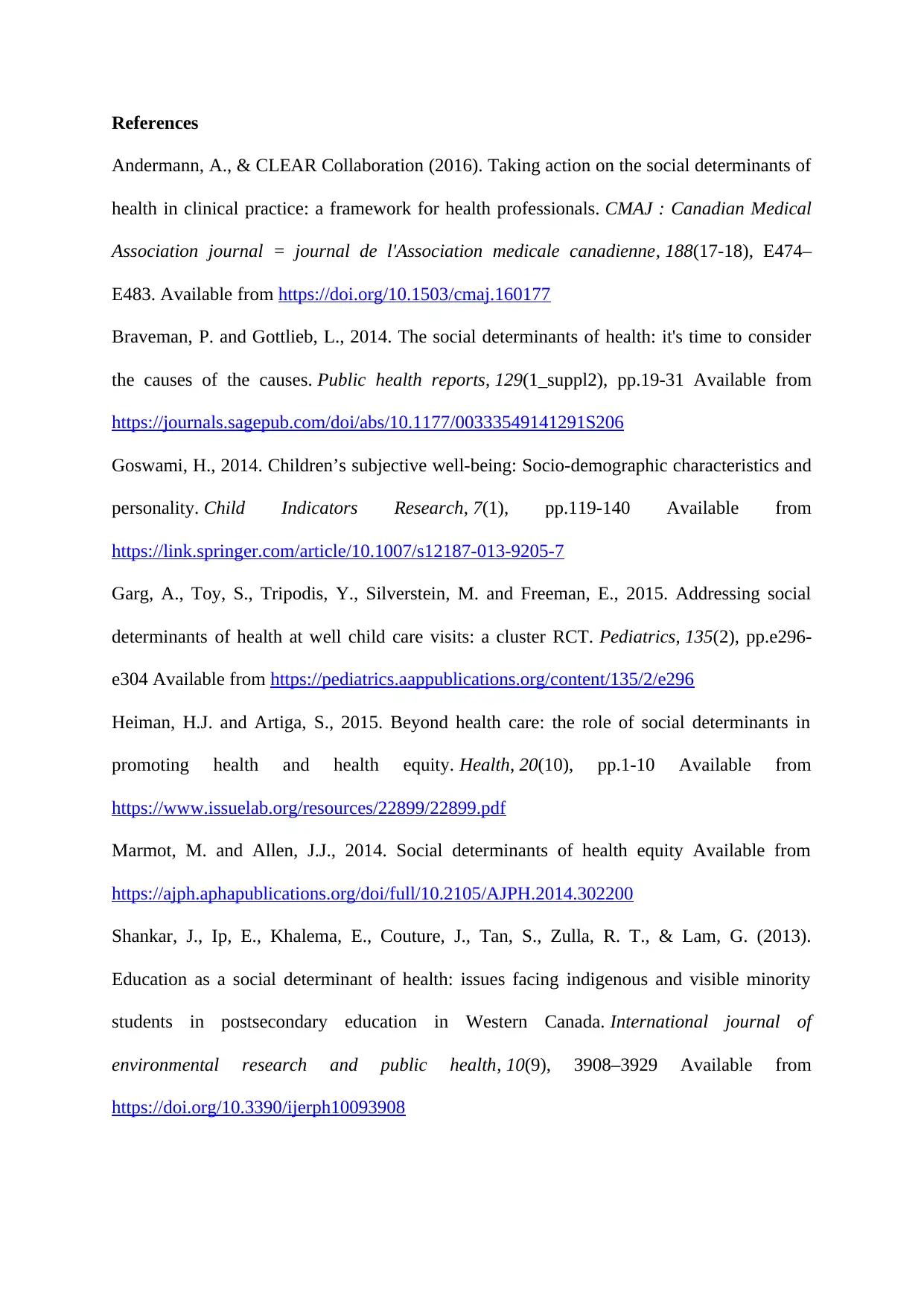
References
Andermann, A., & CLEAR Collaboration (2016). Taking action on the social determinants of
health in clinical practice: a framework for health professionals. CMAJ : Canadian Medical
Association journal = journal de l'Association medicale canadienne, 188(17-18), E474–
E483. Available from https://doi.org/10.1503/cmaj.160177
Braveman, P. and Gottlieb, L., 2014. The social determinants of health: it's time to consider
the causes of the causes. Public health reports, 129(1_suppl2), pp.19-31 Available from
https://journals.sagepub.com/doi/abs/10.1177/00333549141291S206
Goswami, H., 2014. Children’s subjective well-being: Socio-demographic characteristics and
personality. Child Indicators Research, 7(1), pp.119-140 Available from
https://link.springer.com/article/10.1007/s12187-013-9205-7
Garg, A., Toy, S., Tripodis, Y., Silverstein, M. and Freeman, E., 2015. Addressing social
determinants of health at well child care visits: a cluster RCT. Pediatrics, 135(2), pp.e296-
e304 Available from https://pediatrics.aappublications.org/content/135/2/e296
Heiman, H.J. and Artiga, S., 2015. Beyond health care: the role of social determinants in
promoting health and health equity. Health, 20(10), pp.1-10 Available from
https://www.issuelab.org/resources/22899/22899.pdf
Marmot, M. and Allen, J.J., 2014. Social determinants of health equity Available from
https://ajph.aphapublications.org/doi/full/10.2105/AJPH.2014.302200
Shankar, J., Ip, E., Khalema, E., Couture, J., Tan, S., Zulla, R. T., & Lam, G. (2013).
Education as a social determinant of health: issues facing indigenous and visible minority
students in postsecondary education in Western Canada. International journal of
environmental research and public health, 10(9), 3908–3929 Available from
https://doi.org/10.3390/ijerph10093908
Andermann, A., & CLEAR Collaboration (2016). Taking action on the social determinants of
health in clinical practice: a framework for health professionals. CMAJ : Canadian Medical
Association journal = journal de l'Association medicale canadienne, 188(17-18), E474–
E483. Available from https://doi.org/10.1503/cmaj.160177
Braveman, P. and Gottlieb, L., 2014. The social determinants of health: it's time to consider
the causes of the causes. Public health reports, 129(1_suppl2), pp.19-31 Available from
https://journals.sagepub.com/doi/abs/10.1177/00333549141291S206
Goswami, H., 2014. Children’s subjective well-being: Socio-demographic characteristics and
personality. Child Indicators Research, 7(1), pp.119-140 Available from
https://link.springer.com/article/10.1007/s12187-013-9205-7
Garg, A., Toy, S., Tripodis, Y., Silverstein, M. and Freeman, E., 2015. Addressing social
determinants of health at well child care visits: a cluster RCT. Pediatrics, 135(2), pp.e296-
e304 Available from https://pediatrics.aappublications.org/content/135/2/e296
Heiman, H.J. and Artiga, S., 2015. Beyond health care: the role of social determinants in
promoting health and health equity. Health, 20(10), pp.1-10 Available from
https://www.issuelab.org/resources/22899/22899.pdf
Marmot, M. and Allen, J.J., 2014. Social determinants of health equity Available from
https://ajph.aphapublications.org/doi/full/10.2105/AJPH.2014.302200
Shankar, J., Ip, E., Khalema, E., Couture, J., Tan, S., Zulla, R. T., & Lam, G. (2013).
Education as a social determinant of health: issues facing indigenous and visible minority
students in postsecondary education in Western Canada. International journal of
environmental research and public health, 10(9), 3908–3929 Available from
https://doi.org/10.3390/ijerph10093908
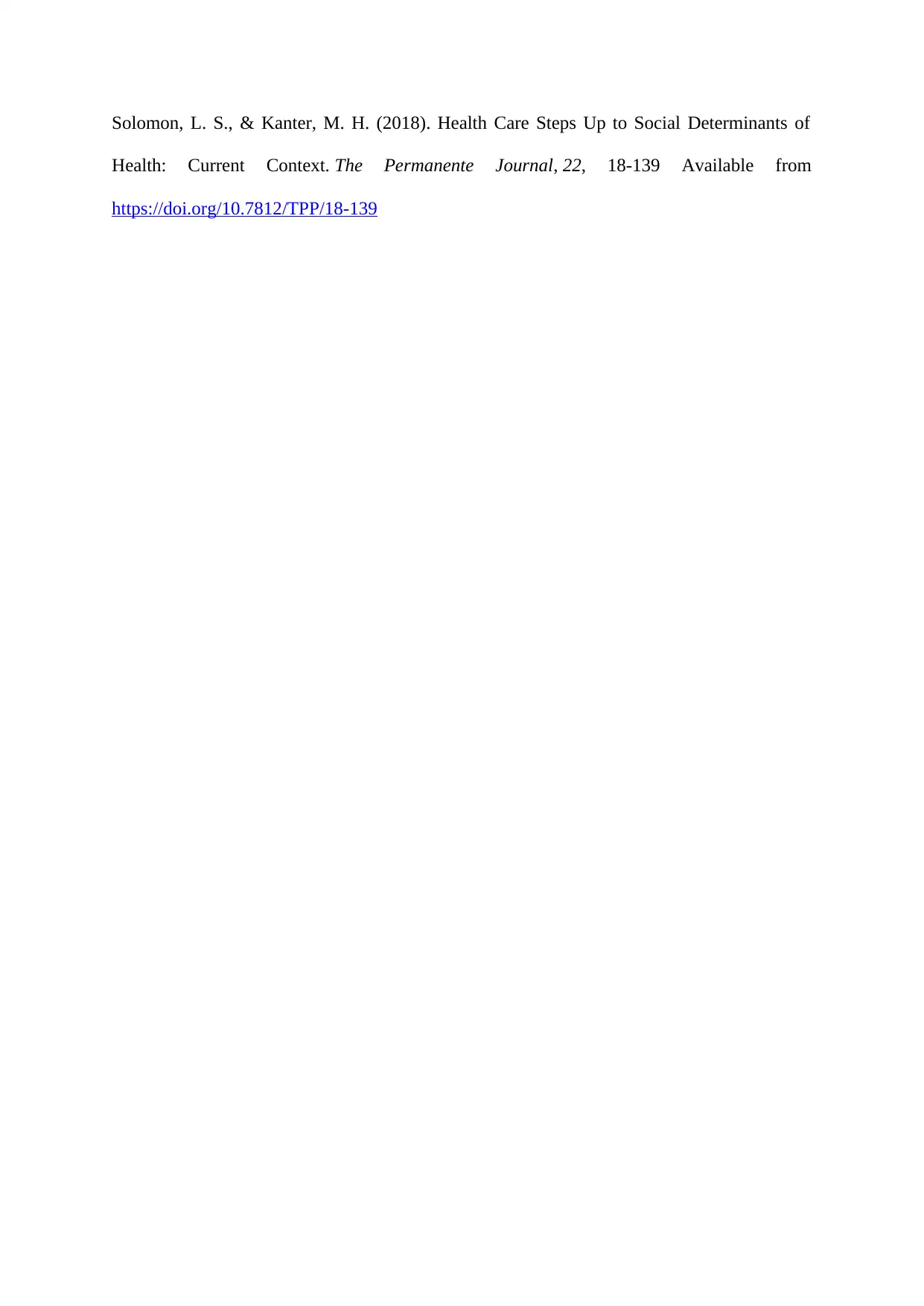
Solomon, L. S., & Kanter, M. H. (2018). Health Care Steps Up to Social Determinants of
Health: Current Context. The Permanente Journal, 22, 18-139 Available from
https://doi.org/10.7812/TPP/18-139
Health: Current Context. The Permanente Journal, 22, 18-139 Available from
https://doi.org/10.7812/TPP/18-139
⊘ This is a preview!⊘
Do you want full access?
Subscribe today to unlock all pages.

Trusted by 1+ million students worldwide
1 out of 6
Related Documents
Your All-in-One AI-Powered Toolkit for Academic Success.
+13062052269
info@desklib.com
Available 24*7 on WhatsApp / Email
![[object Object]](/_next/static/media/star-bottom.7253800d.svg)
Unlock your academic potential
Copyright © 2020–2026 A2Z Services. All Rights Reserved. Developed and managed by ZUCOL.





